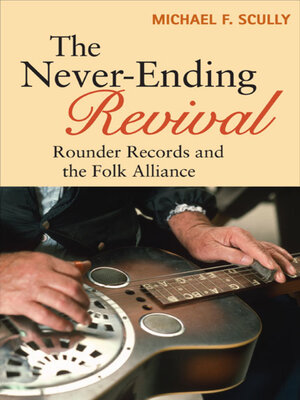The Never-Ending Revival
ebook ∣ Rounder Records and the Folk Alliance · Music in American Life
By Michael F. Scully

Sign up to save your library
With an OverDrive account, you can save your favorite libraries for at-a-glance information about availability. Find out more about OverDrive accounts.
Find this title in Libby, the library reading app by OverDrive.



Search for a digital library with this title
Title found at these libraries:
| Library Name | Distance |
|---|---|
| Loading... |
In recent years, there has been an upsurge in interest in "roots music" and "world music," popular forms that fuse contemporary sounds with traditional vernacular styles. In the 1950s and 1960s, the music industry characterized similar sounds simply as "folk music." Focusing on such music since the 1950s, The Never-Ending Revival: Rounder Records and the Folk Alliance analyzes the intrinsic contradictions of a commercialized folk culture. Both Rounder Records and the North American Folk Music and Dance Alliance have sought to make folk music widely available, while simultaneously respecting its defining traditions and unique community atmosphere. By tracing the histories of these organizations, Michael F. Scully examines the ongoing controversy surrounding the profitability of folk music. He explores the lively debates about the difficulty of making commercially accessible music, honoring tradition, and remaining artistically relevant, all without "selling out."
In the late 1950s through the 1960s, the folk music revival pervaded the mainstream music industry, with artists such as Bob Dylan and Joan Baez singing historically or politically informed ballads based on musical forms from Appalachia and the South. In the twenty-first century, the revival continues, and it includes a variety of music derived from Cajun, African American, and Mexican traditions, among many others. Even though the mainstream music industry and media largely ignore the term "folk music," a strong allure based on nostalgia, the desire for community, and a sense of exclusiveness augments an enthusiastic following connected by word-of-mouth, numerous festivals, and the Internet. There are more folk festivals now than there were during the original boom of the 1960s, suggesting that music artists, agents, and record label representatives are striking a successful balance between tradition and profitability. Scully combines rich interviews of music executives and practicing folk musicians with valuable personal experience to reveal how this American subculture remains in a "never-ending revival" based on fluid definitions of folk and folk music.
|ContentsAcknowledgements / ix
Introduction: Where Have All the Folkies Gone? / 1
1. Folklore, Fakelore, and Poplore: From the Creation of the Folk to the Great Boom and Beyond / 21
2. From Club 47 to Union Grove: The Birth of Rounder Records / 58
3. Surrealistic Banjos and Zydeco Rhythms: Rounder's Broad Aesthetic / 88
4. Toward an Authenticity of Self: Old-Time Music in the Modern World / 114
5. Like Politics in Chicago: The Folk Alliance Strives for Unity / 133
6. Consolidation Blues: Folk Music in Contemporary Markets / 167
Conclusion: Gone to the Internet, Everyone / 211
Notes / 219
Note on Citations / 243
Index / 247
Illustrations follow page 20.|
"Thoughtful and insightful book. . . . Scully's important exploration of the folk music revival ... will only gain in significance as the opportunities for the transmission of folk music increase."—ARSC Journal
"For those of us with a fondness for Rounder and all the offbeat music it has brought us throughout the years, this book . . . is a must-have."—Sing Out!
"Scully explores many facets of the folk music revival. . . . Well written, well researched."—Bluegrass Unlimited
|Michael F. Scully is an attorney and holds a Ph.D. in American Studies from the University of Texas at Austin.







